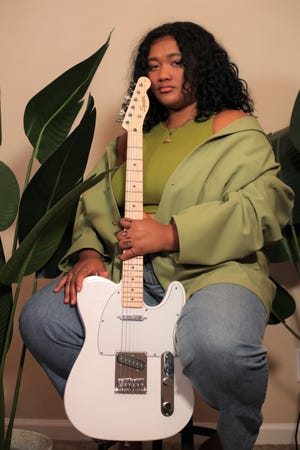New Urban Arts alumnus Storm Ford received the prestigious MacColl Johnson fellowship in music composition from the Rhode Island Foundation. Read more about her award in this Providence Journal article.
Original Article | Downloadable PDF
December 22, 2020
By Donita Naylor
PROVIDENCE — Right away, Storm Ford started spending the $25,000 that came with her fellowship from the Rhode Island Foundation.
A songwriter since the age of 10, the 21-year-old has long known that she needed the privacy, security and availability of a recording studio at home.
Last May, at a live national contest on social media, her voice of liquid silk got her noticed by celebrities of the hip-hop world. T-Pain commented on air: “You can tell that in that girl’s heart, she loves music. It’s something she can’t live without,” he said afterward. “She brought soul, she brought the hypnotic feel to it.”
P Diddy, 6lack and Summer Walker also expressed admiration, and Ford began getting called to Atlanta to work on projects.
Born Caroline Storm Ford in Woonsocket, she was raised mostly by her grandmother in the Hopkinton village of Ashaway. She began using her middle name when she started high school.
The artists’ collaborative on Westminster Street in Providence, New Urban Arts, called to her. It felt like home.
“I was always in the studio,” she said of her junior and senior years of high school. With the help of a mentor and backed by fellow members of the collaborative, she recorded her first album.
By last week, in an apartment made possible by the fellowship, she had her home studio set up and had assembled the musicians and sound technicians for a friend’s project. She could not come to the phone at the scheduled time, one of her aides said, because “She’s in the middle of her camp,” meaning gifted artists were in the studio, they were caught up in the energy and they weren’t coming out anytime soon.
Ford was one of 74 musicians who went through a rigorous application process for one of the 2020 fellowships offered by the Rhode Island Foundation on behalf of the couple who endowed the fund. Every year since 2003, the Robert and Margaret MacColl Johnson Fellowship Fund has awarded up to three $25,000 art fellowships for mid-career Rhode Islanders. The awards rotate, going one year to composers, the next to writers and the third to visual artists. The money comes with no strings attached.
Music is in her nature
Strings, however, are important to fellowship winner Adrienne Taylor, a cellist who grew up in West Chester, Pennsylvania, and was playing in an orchestra in Portugal when a friend emailed her about an opening at Community MusicWorks. She had never seen anything like “an urban chamber music residency,” where she would “teach young people for free and play chamber music. It’s the first time I’d seen a place that brought together so many things that were important to me.”
Now 39, she lives in Providence, is a resident musician at Community MusicWorks and a member of the Providence College cello faculty.
Her family’s earliest inkling that she was musical, she said, came when her older sister started piano lessons.
“I begged for piano lessons. My mom took me to the piano teacher, who said, ‘She’s too young. Bring her back when she’s older.’”
She had to wait until first grade. It was the same with the cello. She wasn’t allowed to start until third grade. “I had to wait for it. I think that’s what made me even more driven.”
Now, she teaches students from second grade through college. “It’s the whole range, which is really fun,” Taylor said. “I never imagined myself as the right personality for teaching young students,” but “I’ve never met a 6-year-old who didn’t love music. You go into a room of young children, and you play a cello for them, and they’re just really excited. They come up and hug you.”
She’s also a composer. The Island Moving Company’s “Night Vision,” choreographed by Danielle Genest and performed for the 2019-20 season, included Taylor on cello, performing what she’d written.
She set two goals on her application for the fellowship. One was to compose more chamber music and the other was to depict natural places in music and describe, also in music, how climate change might affect them.
“Really, it could be anywhere. What place is not going to be affected by climate change?”
Her partner, who is from California and also likes adventuring, introduced her to natural places out West.
It’s good to remember, she said, “especially during tumultuous times, that the streams are still flowing and the hawks are still flying.” Music expresses what words cannot, delivering how it feels to be at that place and breathe the air at the top of a mountain or the edge of a cliff.”
Experiments with sound
Courtney Swain, 31, of East Providence, might have applied for the fellowship just to get a rest. In the last 10 years, she has fronted the indie pop band Bent Knee, recording five albums and touring with them in North America, Europe and Japan while also recording four albums of her own.
She has 10 albums at various stages of completion.
Besides indie pop, she has performed chamber pop and contemporary classical, as well as her own songs, in hundreds of concerts a year. As a keyboardist at Trinity Repertory Company for “Little Shop of Horrors” in 2019, she produced the illusion that the pit orchestra was bigger than it was. She has been a music director and an educator, performed with the Wilbury Theatre Group and the Celebrity Series of Boston and is a voice coach at RIOT, a summer camp for girls (and those who identify as girls) who rock.
Realizing that as a songwriter, touring and recording artist, “I am the asset for basically my business,” she decided to get more into composing for commission, for film or for visual artists.
“It’s especially relevant now with COVID. I’m sort of reaching out, whether that be actually writing pieces or creating soundscapes.”
She found out about the fellowships via an email from the Artists Alliance. She hasn’t subscribed to the alliance, and that email “really just floated into my inbox.” The opportunity was “perfect for me. It was like a very synchronistic moment.”
She has wanted to try out some ideas. She loves being unable to guess the origin of a sound. She has been buying devices or software that distort sound, but they are expensive.
“I don’t like the excuse of not having the right gear, or the right time, as a reason not to create,” she said. “I spent so much time trying to work with and get creative with what I had, that now, with the right gear, the variables become tenfold.”
With the fellowship, she’s been recording onto cassette tapes and altering them with modular synthesis. “I can chop them up and sort of mangle them in different ways, and keep going until I find something I like.”
She wants to create what she calls “really interesting fusion cuisine.”
Swain is half Japanese and lived in Japan until she was 18, learning English from her father. She resisted having to practice the piano, and she didn’t fit in because she looked more Caucasian than Japanese. For fun, Japanese young people go bowling and then sing karaoke. She discovered that on stage, she felt like she belonged.
She left Japan for Boston when she was accepted into the Berklee College of Music.
Next up: Writers
Winners were selected by the Alliance of Artists Communities, which also named three finalists: Anthony Andrade, of Providence; Morgan Johnston, of Barrington; and Roz Grace, of Providence. They will receive $2,500 stipends.
Information about the next round, for writers, is available at the Alliance of Artists Communities, at artistcommunities.org/maccolljohnson.
Robert and Margaret MacColl Johnson, who endowed the fellowships, had a lifelong dedication to the arts. Margaret earned a degree in creative writing from Roger Williams College when she was 70. She died in 1990. Robert, who had invented a process for mixing metals for the jewelry industry, became a full-time painter when he retired. He began discussions about setting up the fellowships before he died in 1999.

